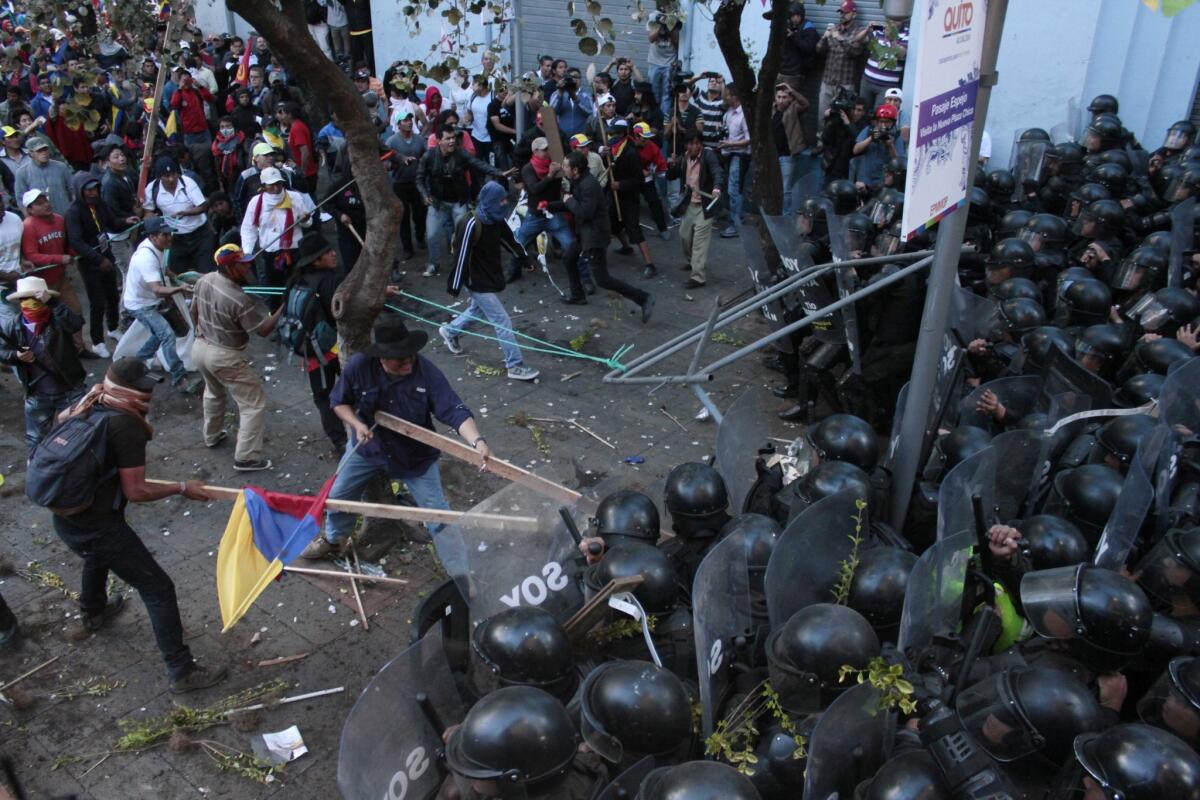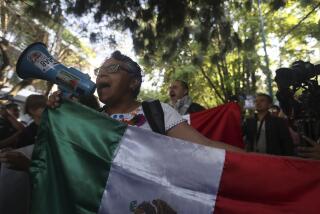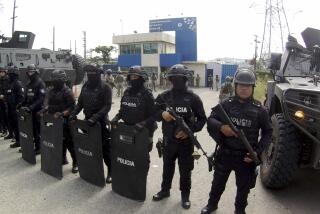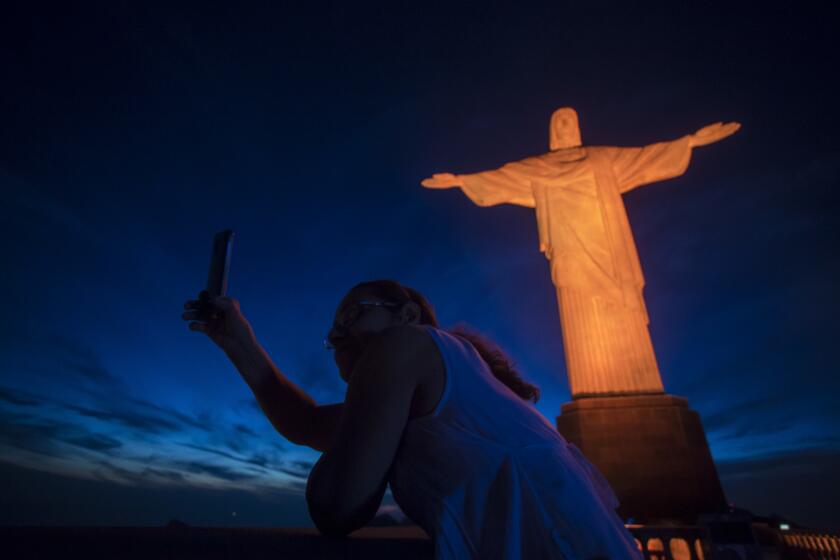Ecuador president’s bid for fourth term faces growing opposition

Protesters clash with police near the government palace in Quito, Ecuador, last week. A strike by a broad coalition upset with the policies of President Rafael Correa largely paralyzed the capital, provincial cities and stretches of the Panamerican highway.
Indigenous schoolteacher Manuel Cartuche was once an ardent supporter of Ecuadorean President Rafael Correa for his stewardship of a booming economy and a road-building program that better connected the country’s once-isolated Andean cities and villages.
Now, the 48-year-old member of the Saraguro ethnic community in southern Ecuador has turned implacable foe. He joined an estimated 10,000 marchers in Quito, the capital, on Wednesday to demonstrate against Correa’s bid for a fourth term in office.
“Correa has reduced access to classes held in our native idiom and sent functionaries to run our programs who don’t understand our culture,” Cartuche said as he joined other protesters in central Quito’s Arbolito Park. “The government has changed an entire structure that took us years to build.”
Called by the Confederation of Indigenous Nationalities of Ecuador, the protest was one of dozens across the nation this month. Trade union members, press freedom advocates and ordinary citizens all have taken to the streets. Last week, as many as 100,000 marched in several cities, and clashes with police led to 20 injuries and 58 arrests, according to news reports.
In addition to issues specific to the indigenous community, opposition has been sparked by Correa’s plan to impose an 80% inheritance tax and raise real estate levies. The government’s plan to reduce welfare payments to poor families and allow oil drilling in the Yasuni nature reserve in the Amazon, which native communities view as ancestral property, have also provoked protests.
Added to the mix is a worsening economy caused in part by the collapse in global oil prices. Taxes on oil exports provide the Ecuadorean government with 45% of its fiscal budget, according to University of Miami professor Bruce Bagley, and those receipts are down sharply.
Declining revenue has forced the government to scale back its social programs, and Correa said Wednesday that he was cutting overall annual spending by $800 million. Government debt has climbed, said analyst Henry Llanes, with lower crude prices making payment more difficult.
“It’s a confluence of issues among many sectors, exacerbated by the deteriorating economy and the authoritarian character of the government,” said Simon Pachano, a political science professor at a graduate school and think tank in Quito known by its Spanish acronym, FLACSO.
Correa has long engendered the ire of middle- and upper-class Ecuadoreans for lashing out at critics during public events such as his Saturday morning TV broadcasts. Press freedom advocates such as the New York-based Committee to Protect Journalists describe his media policies as repressive.
“The situation of the free press in Ecuador has gotten slowly, progressively worse,” the committee’s Carlos Lauria said in a telephone interview. “There is an ongoing attempt by the government not only to restrict dissident views but also to control the flow of information, something Correa learned from [late Venezuelan President] Hugo Chavez.”
Lauria singled out Correa’s 2013 Communications Law that eased the way for sanctions and fines on opposition media as fostering “censorship and self-censorship.”
Despite his critics, the Correa-controlled National Assembly is expected in December to approve a change in the Constitution to permit him to run for a fourth term in February 2017 and possibly extend his time in office until 2021. The former university economics professor took office in early 2007. His critics say a constitutional change should be put to a national plebiscite.
Correa enjoys a 45% approval rating, according to a recent Cedatos poll, which, though down from his 60% approval rating earlier this year, is enough for reelection if it holds up. A candidate who garners 40% or more of votes can win the presidency in the first round of balloting as long as the second-place finisher receives at least 10 percentage points less than the first-place total.
Correa enjoys a solid base of support among Ecuador’s poor, and even his critics acknowledge his road-building and port expansion program that has facilitated economic growth. Correa’s backers counter the indigenous communities’ criticism of new educational standards by saying 50,000 more native children are now receiving basic education than when Correa took office.
With the economic downturn having a widening effect, continued weakness and job losses could chip away at Correa’s support.
Quito lawyer Fabricio Betancourt, 34, said new import duties have especially hit consumers in terms of daily necessities.
“The cost of clothes, household cleaning products, even deodorant and shampoo have risen, and all the government can think of doing is raise taxes,” Betancourt said.
But Bagley says that, despite Correa’s authoritarian style, he is likely to be reelected, in large part because he has brought unaccustomed stability to a country that saw three presidents overthrown in military coups over the 10-year period that ended in 2005.
“I agree that our president sometimes raises his voice against those who criticize him and that he should be more tolerant,” said Margoth Ramirez, a 56-year-old artisan in Quito. “But it’s certain no other leader is better than him. The opposition has not found anyone who can improve on what Correa has done.”
Special correspondents Jaramillo Viteri and Kraul reported from Quito and Bogota, Colombia, respectively.
More to Read
Start your day right
Sign up for Essential California for news, features and recommendations from the L.A. Times and beyond in your inbox six days a week.
You may occasionally receive promotional content from the Los Angeles Times.






